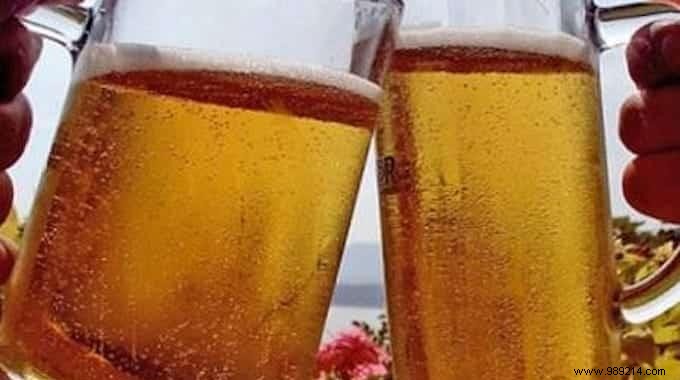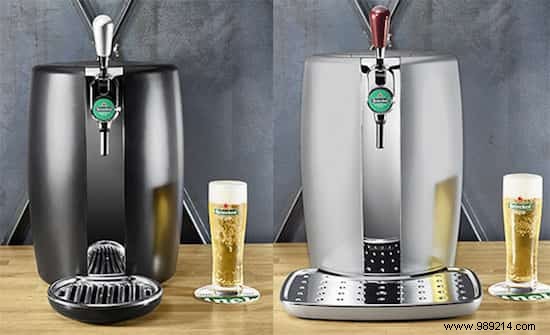
Could a glass of beer a day increase your life expectancy?
Very encouraging signs seem to prove it.
In 2016, researchers at Pennsylvania State University conducted a study of 80,000 adults.
She has shown that drinking 1 or 2 pints of beer daily helps reduce the risk of heart attacks and cardiovascular diseases.

According to this study conducted on Chinese adults, a moderate daily consumption of alcohol (especially beer) helps to slow down the decrease in "good" cholesterol (namely HDL or high density lipoproteins).
In fact, your glass of beer is hiding a lot more health benefits than you suspected! Watch:
According to a 2015 study from the National Institute of Public Health in Helsinki, the risk of developing kidney stones decreases with increasing beer consumption.
Dr. Tero Hirvonen's team of researchers conducted a careful study of 27,000 middle-aged men.
They conclude that each bottle of beer consumed daily reduces the risk of kidney stones by 40% .
The authors of this study observed that the water and alcohol in beer increase and dilute the flow of urine, thereby reducing the risk of stone formation.
Dr. Hirvonen notes that may also increase urinary elimination of calcium, the main component of kidney stones.
Researchers at the University of Scranton in Pennsylvania have found that ale-type (top-fermented dark beer) and stout-type beers (like Guinness) can lower the risk of a heart attack.
Atherosclerosis is a condition of the arterial walls, which thicken due to cholesterol and other fatty substances.
This disease is associated with cardiac disorders. But as demonstrated by Dr. Joe Vinson, lead author of the study, beer can halve the risk of atherosclerosis.
However, the researchers point out that beer must be consumed in moderation to be effective.
Harvard Medical School and the American Heart Association have both conducted studies on people who drink a moderate amount of beer.
They concluded that beer drinkers reduce the risk of stroke by up to 50%, compared to non-drinkers.
The most common strokes occur when a blood clot blocks the flow of blood and oxygen to the brain.
However, when you drink beer, your arteries become more flexible, increasing blood flow significantly.
Therefore, drinking beer prevents blood clots from forming. And as a result, the risk of a stroke also reduces exponentially.
Beer has a high content of silicon, a compound that plays an important role in the formation of the bone system.
Researchers at Tufts University in Massachusetts have found that drinking 1 or 2 glasses of beer a day significantly reduces the risk of a bone fracture.
However, it is important to find the right balance to enjoy its benefits.
Indeed, drinking more than 2 glasses a day increases the risk of a fracture. So be careful the next time you bar hop.
If you drink too much, your bones will weaken and an alcohol-induced fall could well lead to a nasty fracture.
On the other hand, if you drink in moderation, you will return home with dignity AND with stronger bones! Cheers!
According to a Harvard study, drinking 1 or 2 glasses of beer a day can reduce the risk of developing type 2 diabetes by up to 25% in men.
Dr. Michel Joosten conducted his impressive study on no less than 38,000 middle-aged men.
He observed that beer alcohol increases insulin sensitivity, which has a positive effect on the prevention of diabetes.
In addition, beer is rich in soluble dietary fiber.
These plant-based fibers regulate blood sugar levels and play an important dietary role in people with diabetes.
The conclusion ? Even if you don't have diabetes, Social Security would do well to reimburse us for our therapeutic doses of beer!
Beer drinkers have a lower risk of developing cognitive impairment, such as Alzheimer's disease and dementia.
According to several studies, some of which date back to 1977, beer can reduce the risk of developing these cognitive disorders by up to 23%.
However, researchers still don't know why beer has the power to fight cognitive impairment.
Yet the statistics speak for themselves, because in total, these studies were conducted on more than 365,000 people.
One theory suggests that moderate alcohol consumption improves blood circulation and therefore brain metabolism.
Another likely explanation has to do with the high silicon content in beer.
Indeed, researchers believe that silicon protects the brain by mitigating the harmful effects of aluminum in the body, which is one of the probable causes of Alzheimer's.
Beer is a natural sleep aid, especially ale, stout and lager (bottom-fermented beer).
In the brain, these beers stimulate the production of dopamine, a molecule prescribed as a treatment for people suffering from insomnia.
A single sip of beer is enough to increase dopamine levels in the brain, according to a study by Indiana University School of Medicine.
Therefore, beer drinkers are more calm and relaxed.
To take advantage of the benefits of beer against insomnia, the researchers specify that a small dose of 15 ml is sufficient, i.e. the equivalent of a teaspoon.
Everyone knows that drinking too much beer causes blurry vision. On the other hand, in therapeutic doses, beer can be highly beneficial to the health of your eyes!
Researchers at the University of Western Ontario have shown that the high antioxidant content of beer, particularly ales and stouts, reduces the risk of mitochondrial diseases.
In a way, mitochondria are the "powerhouses" of cells, converting glucose into energy.
Cataracts result from damage to the mitochondria of the lens of the eye.
Antioxidants protect the mitochondria from this damage. Therefore, the researchers of this study recommend 1 glass of beer daily to avoid visits to the ophthalmologist.
Could beer help cure cancer? This is what a team of scientific researchers from the University of Idaho thinks.
These researchers presented their results at a conference of the American Chemical Society (American learned society active in the field of chemistry).
They indicate that hops, one of the main ingredients of beer, would be effective in fighting cancer and inflammatory diseases.
Indeed, humulone and lupulin, 2 components of hops, have the property of stopping the growth of bacteria and that of bacterial diseases.
Therefore, research is underway to find a way to extract these components from hops or synthesize them in the laboratory.
The goal is to develop an active ingredient for the drug treatment of cancer.
This benefit may seem contradictory to you, given the famous paunch of heavy beer drinkers!
However, researchers at Oregon State University actually believe that beer can help you shed extra pounds.
Their study demonstrates that xanthohumol, a plant component found only in hops, significantly reduces the risk of metabolic syndrome.
This disease is associated with obesity, hypertension, hyperglycemia and also a decrease in the levels of the "good" cholesterol, high density lipoproteins (HDL).
However, to take advantage of the benefits of this “miracle” molecule, researchers estimate that you would need to drink more than 3,500 pints of beer a day.
With such an amount of alcohol, the real miracle would not be to lose weight, but to stay alive!
Do you like beer? How about being able to enjoy a draft beer at home? Well, that's possible with this beer machine:

Convenient isn't it? You don't even have to go to the local bar to enjoy a draft beer! Click here to get one.
And remember that:"Alcohol abuse is dangerous for your health, drink in moderation .